Community resources are essential for providing emotional support in rare disease advocacy, helping individuals combat feelings of isolation. These resources include organizations like the National Organization for Rare Disorders and Global Genes, which offer support groups and counseling. Online platforms facilitate real-time connection and sharing among advocates, while healthcare professionals play a key role in fostering emotional resilience. Innovative approaches like telehealth services further enhance access to mental health support tailored to the unique challenges faced by rare disease patients.
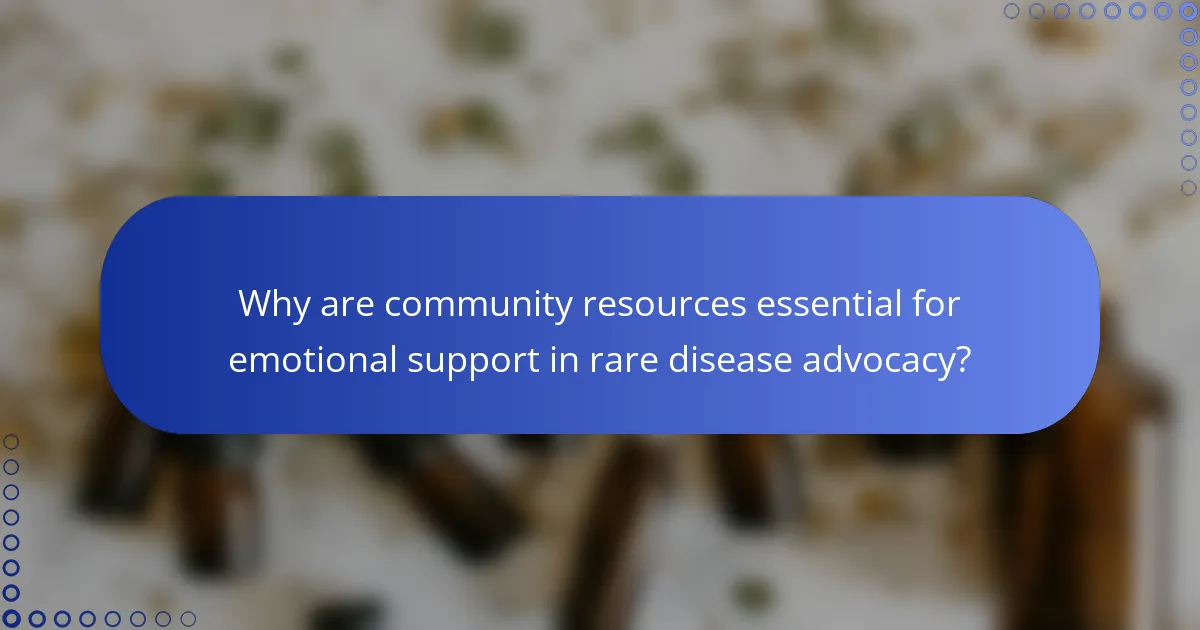
Why are community resources essential for emotional support in rare disease advocacy?
Community resources are vital for emotional support in rare disease advocacy because they foster connection and understanding among affected individuals. These resources provide safe spaces for sharing experiences, which can alleviate feelings of isolation. They also offer access to expert guidance and peer support, enhancing coping mechanisms. Additionally, community resources can facilitate awareness campaigns, driving advocacy efforts that contribute to better healthcare outcomes. Overall, they empower individuals and families to navigate the challenges of rare diseases more effectively.
How do community resources enhance emotional well-being for patients and families?
Community resources significantly enhance emotional well-being for patients and families by providing support networks and access to information. These resources foster connections, reduce feelings of isolation, and promote shared experiences among those affected by rare diseases. Support groups and advocacy organizations often offer emotional support, education, and coping strategies tailored to specific conditions. As a result, families gain resilience and a sense of empowerment, contributing positively to their overall emotional health.
What role do peer support groups play in rare disease advocacy?
Peer support groups are vital in rare disease advocacy as they provide emotional support and a sense of community. These groups foster connections among individuals facing similar challenges, enhancing their coping mechanisms. Participants often share personal experiences, which can lead to increased awareness and understanding of rare diseases. Additionally, peer support groups can influence policy changes by uniting voices for better resources and research funding. Their collective advocacy efforts can drive significant advancements in treatment options and improve overall quality of life for those affected.
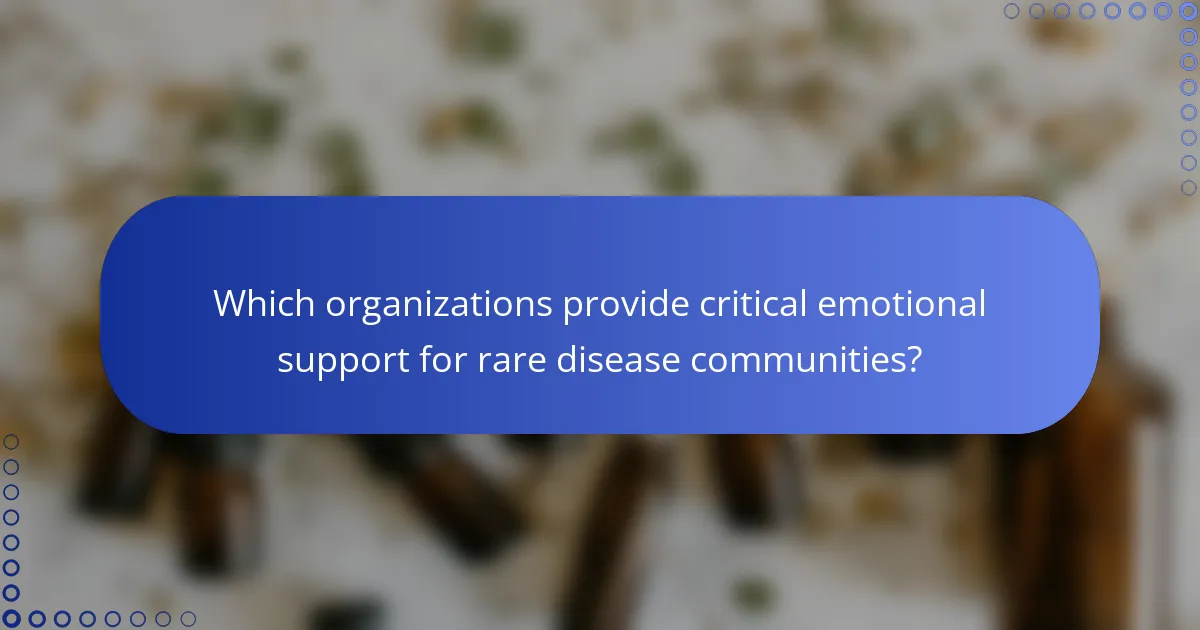
Which organizations provide critical emotional support for rare disease communities?
Organizations providing critical emotional support for rare disease communities include the National Organization for Rare Disorders, Global Genes, and the Rare Disease Foundation. These entities offer resources such as support groups, counseling, and educational materials tailored to the unique challenges faced by individuals and families affected by rare diseases. They foster connections among patients, caregivers, and healthcare professionals, enhancing the emotional well-being of those in the rare disease community.
How does the National Organization for Rare Disorders (NORD) support emotional health?
The National Organization for Rare Disorders (NORD) supports emotional health through community resources and advocacy. NORD provides a network of support groups that connect individuals with rare diseases, offering a platform for sharing experiences. They also offer educational resources that address the emotional challenges faced by patients and families. Additionally, NORD collaborates with mental health professionals to develop programs that specifically target the emotional well-being of those impacted by rare disorders. This multifaceted approach fosters a sense of community and belonging, crucial for emotional support.
What initiatives does the Global Genes Project offer for emotional support?
The Global Genes Project offers various initiatives for emotional support in rare disease advocacy. These include peer-to-peer support networks, online forums, and access to educational resources. Participants can connect with others facing similar challenges, fostering a sense of community. The project also provides mental health resources, ensuring individuals receive comprehensive emotional care.
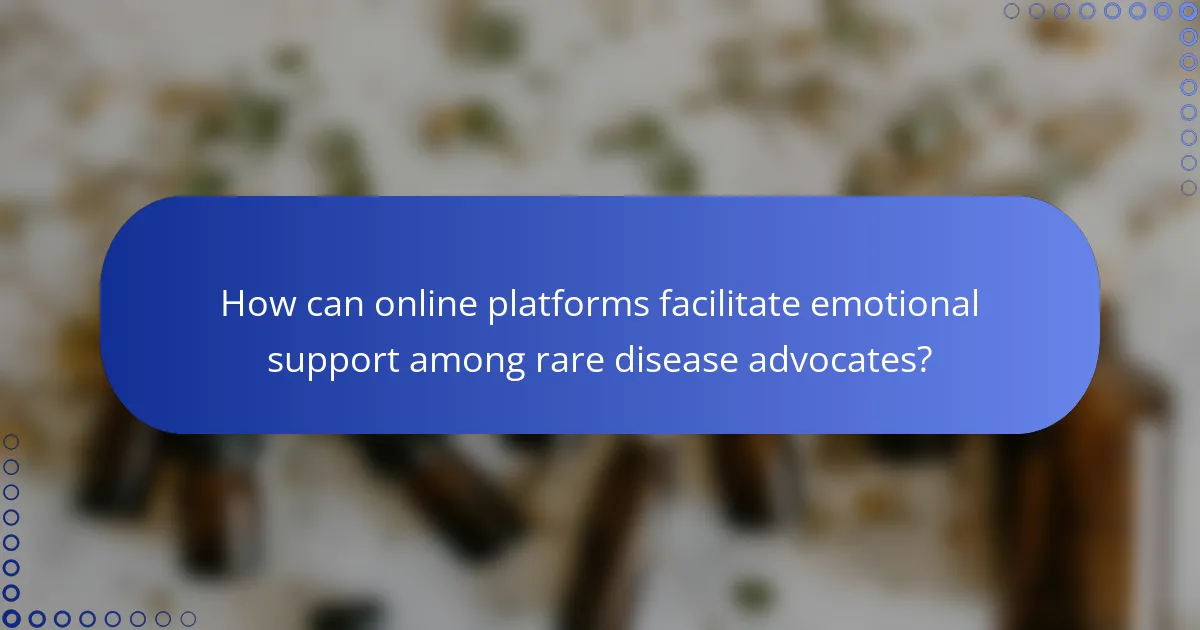
How can online platforms facilitate emotional support among rare disease advocates?
Online platforms can significantly enhance emotional support among rare disease advocates by fostering connection and sharing experiences. They provide accessible forums, social media groups, and dedicated websites where individuals can interact, share resources, and offer encouragement.
These platforms enable real-time communication, allowing advocates to seek advice or emotional reassurance from others facing similar challenges. For instance, virtual support groups can facilitate discussions about coping strategies and emotional well-being, creating a sense of community.
Additionally, online resources often include expert-led webinars and educational materials that empower advocates with knowledge, further enhancing their ability to support one another. This combination of peer support and expert information contributes to a more resilient advocacy community.
As a result, online platforms serve as vital tools for emotional support, helping individuals navigate the complexities of rare diseases while building lasting connections.
What are the benefits of virtual support groups for rare disease patients?
Virtual support groups provide essential emotional benefits for rare disease patients. They foster connection, reduce feelings of isolation, and offer shared experiences that enhance coping strategies. Participants gain access to valuable resources and expert insights, which can improve their understanding of their condition. These groups also promote advocacy, empowering patients to voice their needs and influence healthcare policies. Overall, virtual support groups create a sense of community that is crucial for emotional well-being in rare disease advocacy.
Which social media platforms are most effective for connecting rare disease advocates?
Facebook, Twitter, and Instagram are the most effective social media platforms for connecting rare disease advocates. These platforms foster community engagement and provide spaces for sharing personal stories and resources. Facebook groups allow for in-depth discussions and support. Twitter enables real-time updates and connections with advocacy organizations. Instagram offers visual storytelling, which can resonate emotionally with audiences. Each platform has unique attributes that enhance advocacy efforts, such as Facebook’s group features, Twitter’s hashtags for visibility, and Instagram’s emphasis on imagery.
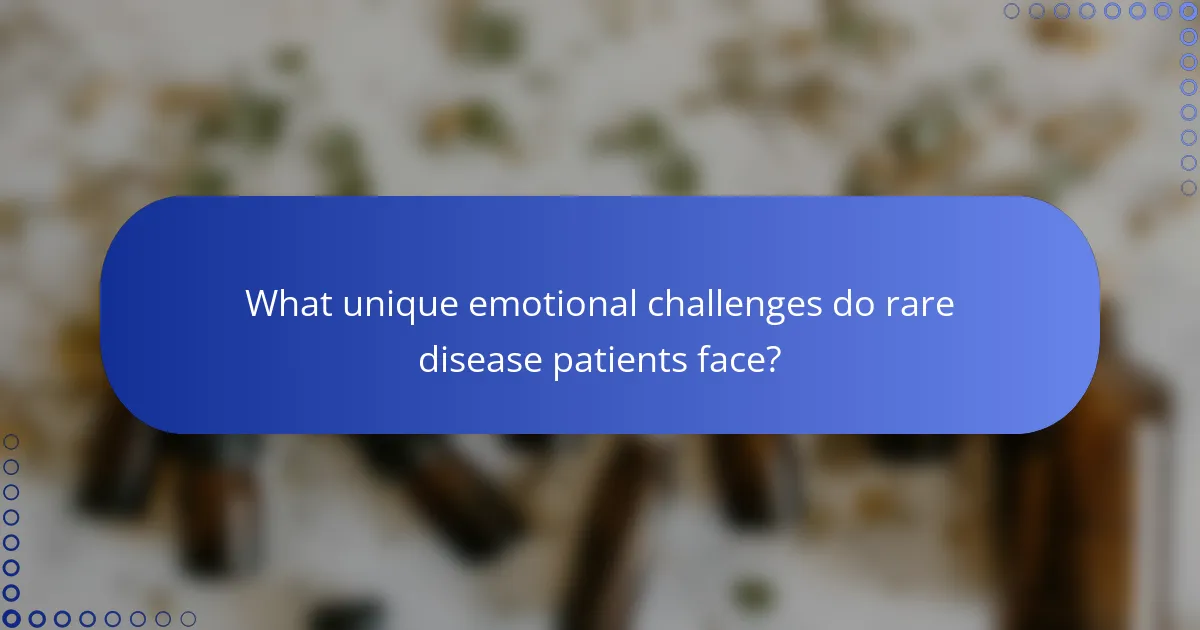
What unique emotional challenges do rare disease patients face?
Rare disease patients face unique emotional challenges due to isolation, uncertainty, and stigma. These individuals often struggle to find understanding and support, leading to feelings of loneliness. Community resources play a crucial role in providing emotional support and fostering connections among patients. Support groups and advocacy organizations can offer shared experiences, helping patients cope with their situations. Additionally, mental health services tailored for rare disease patients can address specific emotional needs, enhancing overall well-being. Access to these resources can significantly impact their emotional resilience and quality of life.
How do cultural perceptions of rare diseases impact emotional support needs?
Cultural perceptions of rare diseases significantly influence emotional support needs. These perceptions shape community resources, affecting how individuals connect with advocacy groups.
Stigma surrounding rare diseases can lead to isolation, making emotional support essential. Communities with a positive perception foster stronger advocacy networks, enhancing access to mental health resources.
Cultural attitudes also determine the availability of support services. In cultures where rare diseases are misunderstood, individuals may struggle to find adequate emotional assistance.
Ultimately, promoting awareness and understanding can bridge gaps in emotional support, improving the overall well-being of those affected by rare diseases.
What specific coping strategies are beneficial for families of rare disease patients?
Families of rare disease patients benefit from various coping strategies that enhance emotional support. Engaging with support groups provides shared experiences and understanding. Accessing mental health resources helps families process emotions and develop resilience. Utilizing online forums fosters community connection and information exchange. Regular participation in advocacy events strengthens family bonds and raises awareness. Seeking professional counseling offers tailored support for individual and family challenges.
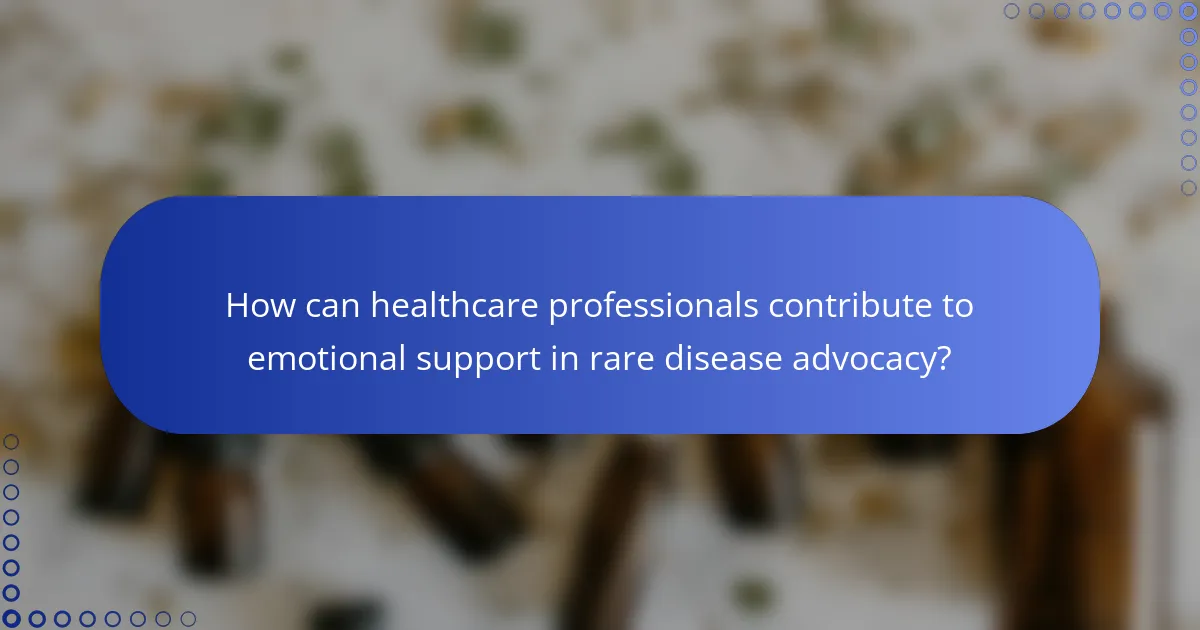
How can healthcare professionals contribute to emotional support in rare disease advocacy?
Healthcare professionals play a crucial role in providing emotional support in rare disease advocacy. They can offer guidance, resources, and a listening ear to patients and families navigating complex challenges.
By fostering connections within the healthcare community, professionals can help build networks that facilitate emotional resilience. They can also participate in support groups, providing education and reassurance to those affected by rare diseases.
Additionally, healthcare professionals can advocate for mental health resources tailored to the unique needs of rare disease patients, ensuring that emotional well-being is prioritized alongside medical treatment.
Their involvement in awareness campaigns can further amplify the voices of those affected, helping to reduce stigma and promote understanding in society.
What training do healthcare providers need to better support rare disease patients?
Healthcare providers need training in communication, empathy, and awareness of community resources to effectively support rare disease patients. Understanding the emotional challenges faced by these patients is crucial. Training should include knowledge of support groups, counseling services, and advocacy organizations. This equips providers to guide patients toward resources that foster emotional well-being and community connection. Additionally, providers should be trained to recognize the unique attributes of each rare disease, which can vary widely in symptoms and patient experiences.
How can interdisciplinary teams improve emotional care for rare disease patients?
Interdisciplinary teams enhance emotional care for rare disease patients by integrating diverse expertise. Collaboration among healthcare providers, psychologists, and social workers fosters comprehensive support. This approach addresses unique emotional challenges, improving patient outcomes. Research indicates that such teamwork increases patient satisfaction and reduces feelings of isolation. Enhanced communication and resource sharing among team members create a holistic care environment, ultimately benefiting patients and their families.
What are the best practices for integrating emotional support into treatment plans?
Integrating emotional support into treatment plans involves leveraging community resources effectively. Collaboration with local support groups enhances patient engagement and provides emotional relief. Utilizing online forums fosters connection among patients facing similar challenges. Regularly assessing emotional needs ensures tailored support. Engaging family members in the process strengthens the support network.
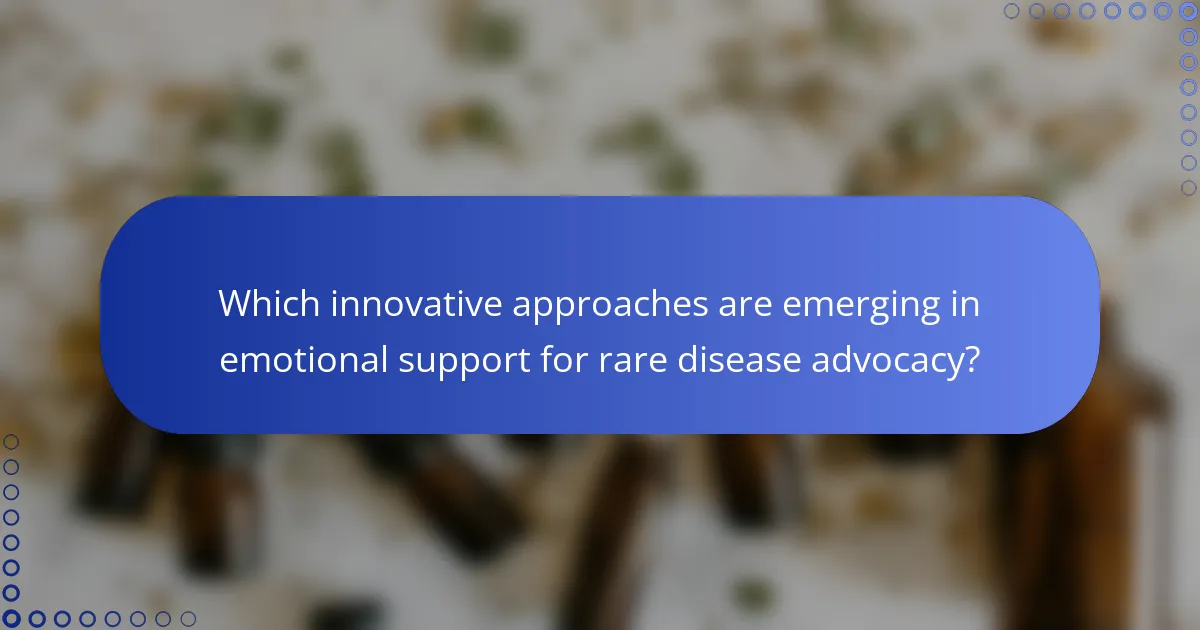
Which innovative approaches are emerging in emotional support for rare disease advocacy?
Emerging innovative approaches in emotional support for rare disease advocacy include digital platforms, peer support networks, and telehealth services. These resources enhance community engagement and provide personalized assistance. Digital platforms connect individuals to information and support groups, fostering a sense of belonging. Peer support networks enable shared experiences, promoting emotional resilience. Telehealth services offer convenient access to mental health professionals, addressing unique challenges faced by rare disease patients. These strategies collectively improve emotional well-being and advocacy efforts.
How is technology transforming emotional support services for rare disease communities?
Technology is significantly enhancing emotional support services for rare disease communities. Virtual platforms facilitate connections among patients, caregivers, and advocates, fostering a sense of belonging. Mobile applications offer access to resources, support groups, and mental health tools tailored for specific conditions. Telehealth services provide immediate counseling, breaking geographical barriers. Online forums enable sharing experiences and coping strategies, creating a supportive network. These innovations empower individuals, improving their emotional well-being and resilience in facing rare diseases.
What role do art and music therapy play in the emotional well-being of rare disease patients?
Art and music therapy significantly enhance the emotional well-being of rare disease patients. These therapies provide creative outlets, fostering expression and connection. They reduce feelings of isolation and anxiety, promoting a sense of community among patients. Research indicates that engaging in these therapies can improve mood and overall mental health. Additionally, art and music therapy can serve as coping mechanisms, helping patients manage the emotional toll of their conditions.
How can advocacy campaigns raise awareness about emotional support needs?
Advocacy campaigns can effectively raise awareness about emotional support needs by leveraging community resources. These campaigns can provide information about local support groups, mental health services, and online platforms dedicated to rare diseases. Engaging storytelling and personal testimonies can highlight the emotional challenges faced by individuals, fostering empathy and understanding. Collaborating with healthcare professionals enhances credibility and outreach, ensuring that accurate information reaches those in need. Social media can amplify these efforts, creating a broader dialogue around emotional support and encouraging community involvement.
What common mistakes should advocates avoid when seeking emotional support resources?
Advocates should avoid assuming all emotional support resources are suitable for everyone. Focus on personalized approaches that consider individual needs and circumstances.
Common mistakes include neglecting to research available resources, overlooking local support groups, and failing to communicate specific emotional needs. Advocates may also underestimate the importance of follow-up support, which is crucial for sustained emotional well-being.
Additionally, avoid relying solely on online resources without verifying their credibility. Engaging with community members can provide valuable insights and recommendations. Lastly, don’t forget to consider the diverse needs of the rare disease community, ensuring inclusivity in resource selection.